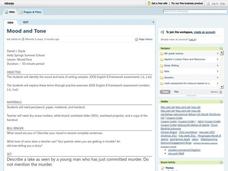Curated OER
Warm Colors vs Cool colors
Students discuss the difference between warm and cool colors. They discuss things such as mood, seasons. Also, students take an imaginary trip inside of their bedrooms to figure out their bedroom is warm or cool in color. Students...
Curated OER
Color Mixing/ Fantastic Shapes in Paining
Young scholars paint shapes in pictures using all of the colors in the color wheel. For this colors lesson plan, students learn about primary and secondary colors, and create non representational art with the colors.
Curated OER
Color Me Happy: Color, Mood, and Tone
This lesson introduces students to the ways artists use color to set the tone of a painting or to convey a particular mood to the viewer. Students view "The Tragedy" by Pablo Picasso. They fill in an information chart describing the mood...
Curated OER
Color Me Happy: Color, Mood, and Tone
High schoolers identify color schemes in paintings and discuss the ways in which color is used to convey a mood or tone in a work of art.
Curated OER
Color Me Happy: Color, Mood, and Tone
Students examine how artists use color to set the tone of a painting. They analyze and discuss various paintings, complete a chart comparing the artists' color schemes and tones, and write a paragraph comparing two images.
Curated OER
Mood and Tone
Students describe their current mood in several complete sentences. They compare their moods with moods set by authors through the tone of their writing. Students read a teacher prepared handout about mood/tone of writing. They write...
Curated OER
Fall Reflections
Students create a multi-media landscape of a tree in fall color. They use the Y-method of drawing a tree.
California State University
Warm Sun and Too Cool Moon
Basic color theory introduced in a creative way. Students gain understanding of warm and cool colors as they each choose a palette and paint a sun or a moon.
Physics Central
Physics Central: Physics in Your Glass: Racing Molecules
An easy experiment for demonstrating and exploring molecule movement requiring common household items: two glasses, two dark colors of food coloring, and warm and cold water. A few variations to the experiment will have students using...










